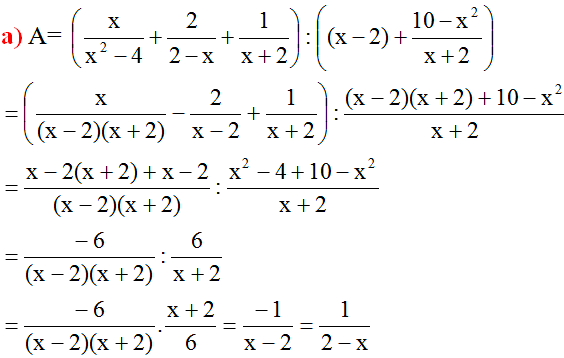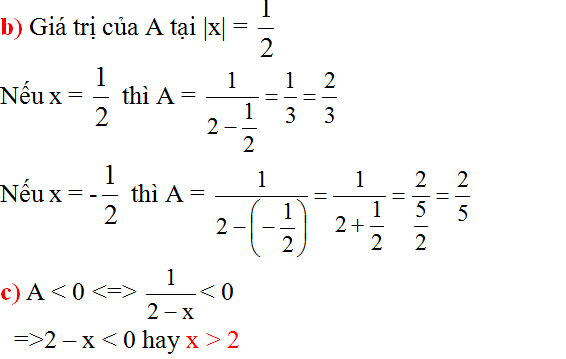Hãy nhập câu hỏi của bạn vào đây, nếu là tài khoản VIP, bạn sẽ được ưu tiên trả lời.

a,ĐK: \(\hept{\begin{cases}x\ne0\\x\ne\pm3\end{cases}}\)
b, \(A=\left(\frac{9}{x\left(x-3\right)\left(x+3\right)}+\frac{1}{x+3}\right):\left(\frac{x-3}{x\left(x+3\right)}-\frac{x}{3\left(x+3\right)}\right)\)
\(=\frac{9+x\left(x-3\right)}{x\left(x-3\right)\left(x+3\right)}:\frac{3\left(x-3\right)-x^2}{3x\left(x+3\right)}\)
\(=\frac{x^2-3x+9}{x\left(x-3\right)\left(x+3\right)}.\frac{3x\left(x+3\right)}{-x^2+3x-9}=\frac{-3}{x-3}\)
c, Với x = 4 thỏa mãn ĐKXĐ thì
\(A=\frac{-3}{4-3}=-3\)
d, \(A\in Z\Rightarrow-3⋮\left(x-3\right)\)
\(\Rightarrow x-3\inƯ\left(-3\right)=\left\{-3;-1;1;3\right\}\Rightarrow x\in\left\{0;2;4;6\right\}\)
Mà \(x\ne0\Rightarrow x\in\left\{2;4;6\right\}\)


Vì \(x^2-4x+5=x^2-4x+4+1=\left(x-2\right)^2+1\ge1>0\) với mọi giá trị của \(x\) nên giá trị của biểu thức luôn luôn âm với mọi giá trị khác 0 và khác -3 của \(x\)

\(a,P=\left[\dfrac{x+1}{3x\left(x+1\right)}-\dfrac{2x-1}{3x\left(2x-1\right)}-1\right]\cdot\dfrac{2x}{1-x}\left(x\ne1;x\ne-1;x\ne0\right)\\ P=\left(\dfrac{1}{3x}-\dfrac{1}{3x}-1\right)\cdot\dfrac{2x}{1-x}\\ P=-1\cdot\dfrac{2x}{1-x}=\dfrac{2x}{x-1}\\ b,P=2+\dfrac{2}{x-1}\in Z\\ \Leftrightarrow x-1\inƯ\left(2\right)=\left\{-2;-1;1;2\right\}\\ \Leftrightarrow x\in\left\{2;3\right\}\left(x\ne-1;x\ne0\right)\\ c,P\le1\Leftrightarrow\dfrac{2x}{x-1}-1\le0\\ \Leftrightarrow\dfrac{x+1}{x-1}\le0\\ \Leftrightarrow\left[{}\begin{matrix}\left\{{}\begin{matrix}x+1\le0\\x-1>0\end{matrix}\right.\\\left\{{}\begin{matrix}x+1\ge0\\x-1< 0\end{matrix}\right.\end{matrix}\right.\Leftrightarrow-1\le x< 1\)
a: \(P=\left(\dfrac{x+1}{3x\left(x+1\right)}-\dfrac{2x-1}{3x\left(2x-1\right)}-1\right)\cdot\dfrac{2x}{x-1}\)
\(=\dfrac{1-1-3x}{3x}\cdot\dfrac{2x}{x-1}\)
\(=\dfrac{-3x}{3x}\cdot\dfrac{2x}{x-1}=\dfrac{-2x}{x-1}\)

Lời giải của bạn Nhật Linh đúng rồi, tuy nhiên cần thêm điều kiện để A có nghĩa: \(x\ne\pm2\)

a: \(A=\left(\dfrac{2x^2+2}{x^3-1}+\dfrac{x^2-x+1}{x^4+x^2+1}-\dfrac{x^2+3}{x^3-x^2+3x-3}\right):\dfrac{1}{x-1}\)
\(=\left(\dfrac{2x^2+2}{\left(x-1\right)\left(x^2+x+1\right)}+\dfrac{x^2-x+1}{x^4+2x^2+1-x^2}-\dfrac{x^2+3}{x^2\left(x-1\right)+3\left(x-1\right)}\right)\cdot\dfrac{x-1}{1}\)
\(=\left(\dfrac{2x^2+2}{\left(x-1\right)\left(x^2+x+1\right)}+\dfrac{\left(x^2-x+1\right)}{\left(x^2+1\right)^2-x^2}-\dfrac{x^2+3}{\left(x-1\right)\left(x^2+3\right)}\right)\cdot\dfrac{x-1}{1}\)
\(=\left(\dfrac{2x^2+3}{\left(x-1\right)\left(x^2+x+1\right)}+\dfrac{x^2-x+1}{\left(x^2+1+x\right)\left(x^2+1-x\right)}-\dfrac{1}{x-1}\right)\cdot\dfrac{x-1}{1}\)
\(=\left(\dfrac{2x^2+3}{\left(x-1\right)\left(x^2+x+1\right)}+\dfrac{1}{x^2+x+1}-\dfrac{1}{x-1}\right)\cdot\dfrac{x-1}{1}\)
\(=\dfrac{2x^2+3+x-1-x^2-x-1}{\left(x-1\right)\left(x^2+x+1\right)}\cdot\dfrac{x-1}{1}\)
\(=\dfrac{x^2+1}{x^2+x+1}\)
b: Để A là số nguyên thì \(x^2+1⋮x^2+x+1\)
=>\(x^2+x+1-x⋮x^2+x+1\)
=>\(x⋮x^2+x+1\)
=>\(x^2+x⋮x^2+x+1\)
=>\(x^2+x+1-1⋮x^2+x+1\)
=>\(-1⋮x^2+x+1\)
=>\(x^2+x+1\in\left\{1;-1\right\}\)
=>\(x^2+x+1=1\)
=>x2+x=0
=>x(x+1)=0
=>\(x\in\left\{0;-1\right\}\)

a) \(ĐKXĐ:\hept{\begin{cases}x\ne\pm2\\x\ne-3\end{cases}}\)
b) \(P=1+\frac{x+3}{x^2+5x+6}\div\left(\frac{8x^2}{4x^3-8x^2}-\frac{3x}{3x^2-12}-\frac{1}{x+2}\right)\)
\(\Leftrightarrow P=1+\frac{x+3}{\left(x+3\right)\left(x+2\right)}:\left(\frac{8x^2}{4x^2\left(x-2\right)}-\frac{3x}{3\left(x^2-4\right)}-\frac{1}{x+2}\right)\)
\(\Leftrightarrow P=1+\frac{1}{x+2}:\left(\frac{2}{x-2}-\frac{x}{\left(x-2\right)\left(x+2\right)}-\frac{1}{x+2}\right)\)
\(\Leftrightarrow P=1+\frac{1}{x+2}:\frac{2x+4-x-x+2}{\left(x-2\right)\left(x+2\right)}\)
\(\Leftrightarrow P=1+\frac{1}{x+2}:\frac{6}{\left(x-2\right)\left(x+2\right)}\)
\(\Leftrightarrow P=1+\frac{\left(x-2\right)\left(x+2\right)}{6\left(x+2\right)}\)
\(\Leftrightarrow P=1+\frac{x-2}{6}\)
\(\Leftrightarrow P=\frac{x+4}{6}\)
c) Để P = 0
\(\Leftrightarrow\frac{x+4}{6}=0\)
\(\Leftrightarrow x+4=0\)
\(\Leftrightarrow x=-4\)
Để P = 1
\(\Leftrightarrow\frac{x+4}{6}=1\)
\(\Leftrightarrow x+4=6\)
\(\Leftrightarrow x=2\)
d) Để P > 0
\(\Leftrightarrow\frac{x+4}{6}>0\)
\(\Leftrightarrow x+4>0\)(Vì 6>0)
\(\Leftrightarrow x>-4\)

